Darjeeling Limited: 3 Tea Estates
This past summer Shawn and David visited Darjeeling and these three wonderful tea estates.
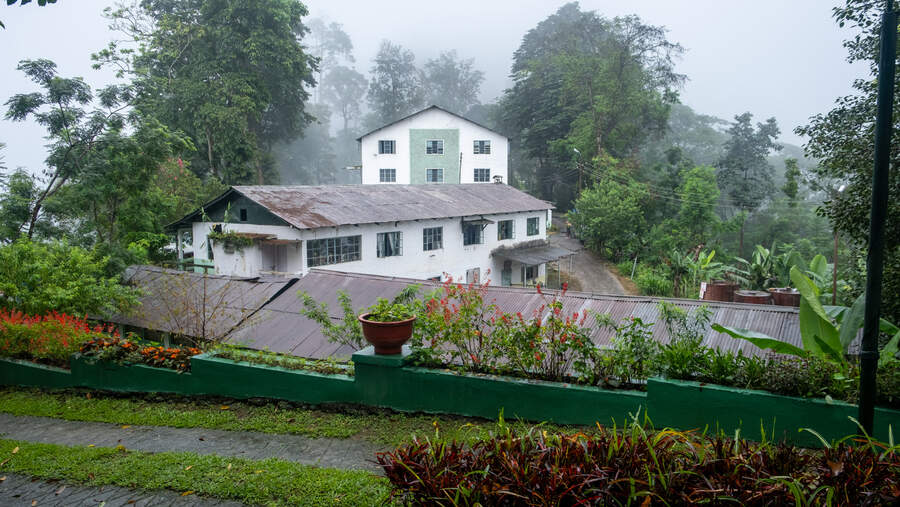
In 2012, I took my first trip to Darjeeling, India. By that point, the store had been open for 5 years, and we just hired Shawn. It was my second International trip (the first being to China 2 years before), and I was full of excitement to experience India in general, and Darjeeling more specifically.
Now 11 years later, I made my return to India, and this time, Shawn was able to come along to see one of the jewels of the tea industry!
Darjeeling
Located in northeastern India, Darjeeling is renowned for its distinctive black teas. Known as the "Champagne of Teas," Darjeeling tea is unique due to its muscatel flavor and delicate aroma, a result of the region's cool, moist climate and the terrain with elevations 6,000 feet and above.
The history of tea in Darjeeling began with the British in the mid-19th century, who established tea gardens using Chinese tea plant varieties. This was done because tea in Assam had not been discovered yet, and Chinese plants were all anyone knew existed. Over time, these estates evolved into a thriving industry, with Darjeeling tea gaining a global reputation for quality.
Brewing
To brew Darjeeling tea, it's recommended to use fresh, filtered water heated to just below boiling. A steeping time of 2-3 minutes is ideal, ensuring the flavors are extracted without bitterness. The resulting brew is light in color with a floral aroma, offering a layered taste experience from fruity and vegetal with a mild astringency.
The Trip
Shawn and I had the opportunity to visit three tea estates while in Darjeeling. Each has its history and quirks, but all care about tea deeply. You can get a gift pack of Darjeelings to experience these and other estates.
Glenburn Estate
Established in 1859 it is now managed by the Prakash family. Glenburn blends the history of Darjeeling tea with the area's natural beauty, maintaining traditional tea-making practices while integrating them with the surrounding landscape.
The estate's focus on preserving tea traditions and embracing the natural beauty of Darjeeling reflects the region's identity: a harmonious blend of historical richness and the allure of one of the world's most exquisite tea-growing areas.
We had an extensive factory tour, but first we met with the tea maker in his office. He had complex daily weather graphs at different elevations pinned to the walls, and countless bound ledgers where he notes the daily conditions. Here, he logs what nuanced changes were made to the processing of tea leaves in response to these factors. Every day the variables are assed to determine how long to wilt the leaves, or how much to roll and bake them. Every day is a fresh decision, which is part art, part science. He discussed with enthusiasm his care for the perfect cup, as well as the challenges and opportunities of the region.
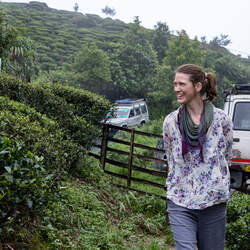
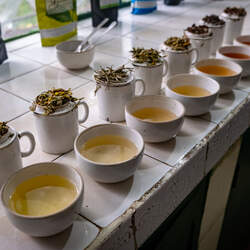
A flight of Darjeeling concluded our factory visit
Giddapahar Estate
The next stop was Giddapahar Tea Estate, known locally as "Eagle's Cliff" and established in 1881. Managed by the Shaw family, it lies in the Kurseong Valley and is known for its AV2 clonal teas from China bushes. These teas are light and mellow, a hallmark of Darjeeling's unique offerings. Giddapahar's production plays a significant role in the region's tea economy, with its teas being a favorite among enthusiasts.
Mr. Shaw is a dedicated teamaker, arising before daybreak to assess the stages of wilting leaves in order to plan the day's approach. His factory door is a few short paces away from his family home, so he gets started pretty swiftly! His pride and care of the entire facility was palpable, with good reason. The small estate is superb. He had recently finished a new buildout at the property, which further complimented the innovative use of space upon the mountainside, perfectly situated above the sprawling tea fields and mist.
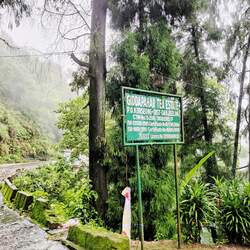
After a steep ascent, we arrive at Giddapahar Estate.
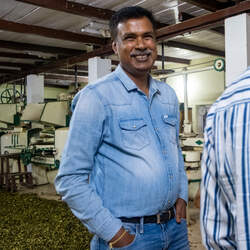
Mr. Shaw was as hospitable as he is personable!
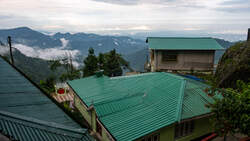
The factory (left) and the Shaw family home (right).
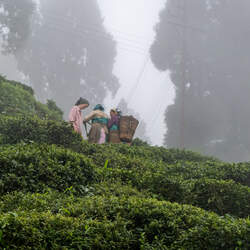
Shawn chats with tea pluckers in the early morning.
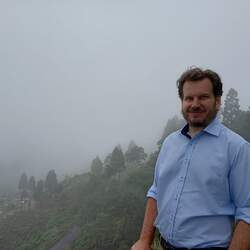
Doke Estate
Our journey concluded at Doke Tea Estate in Bihar (next to Darjeeling), showcasing a different aspect of Indian tea culture. Founded by Rajiv Lochan, Doke focuses on ecological sustainability and innovative tea production. As Rajiv steps back, his son Vivek is taking over the operations, and he invited us to spend a beautiful afternoon at the estate. Bihar, with its rich history and cultural heritage, provides a contrasting backdrop to the traditional tea regions of India. The Lochan family's approach to tea-making at Doke is a blend of traditional methods and modern practices, reflecting a commitment to both quality and environmental stewardship. We brought back a tea they call "Black Fusion," which is entirely handmade, from start to finish: plucking, rolling and heating.
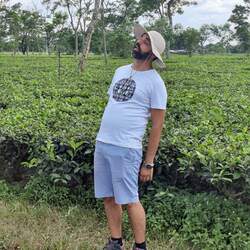
Vivek was stimulating company, from beginning to end!
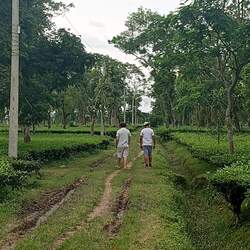
Me and Vivek, having a walk and talk.
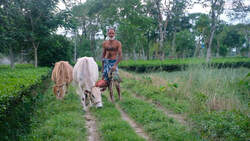
You can't go to India without acknowledging the cows.
This journey through Darjeeling and nearby regions highlighted the diversity and depth of India's tea culture. From the traditional practices at Glenburn and Giddapahar in Darjeeling to the innovative approaches at Doke in Bihar, each estate contributes to the rich narrative of Indian tea.
The Darjeeling Limited Gift Pack
We have put together a gift pack of 7 teas from Darjeeling. Featuring tea Giddaparh and Glenburn estates, as well as others in Darjeeling.
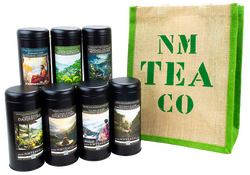
Check out the Darjeeling Limited Pack. $120

